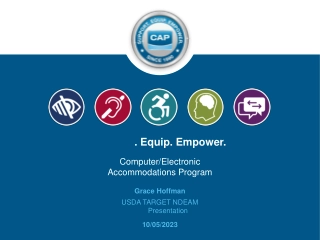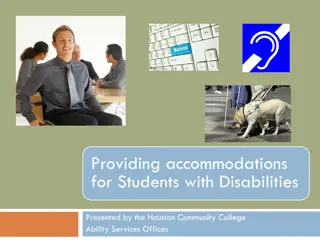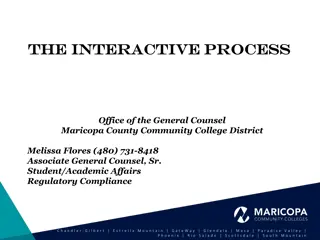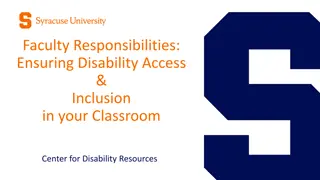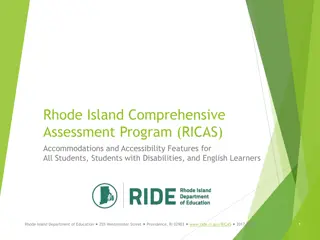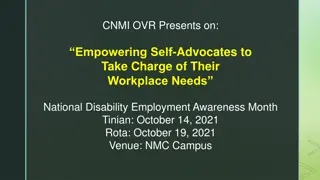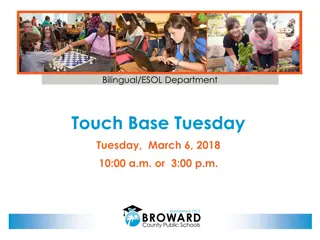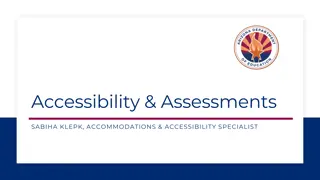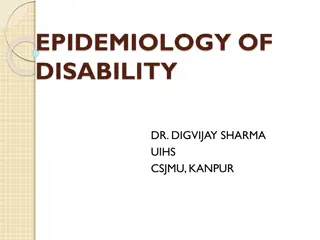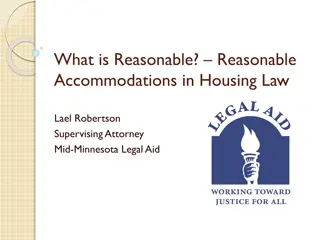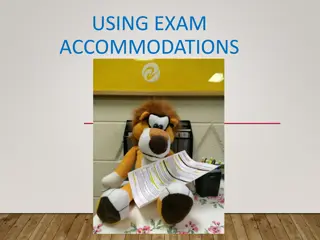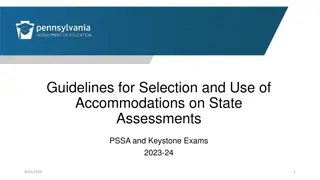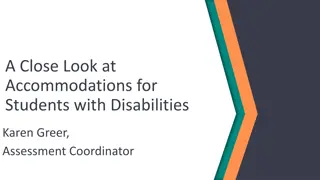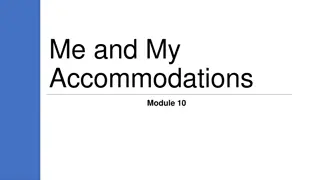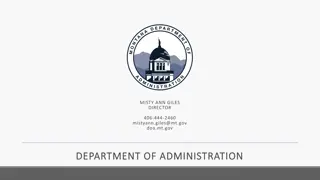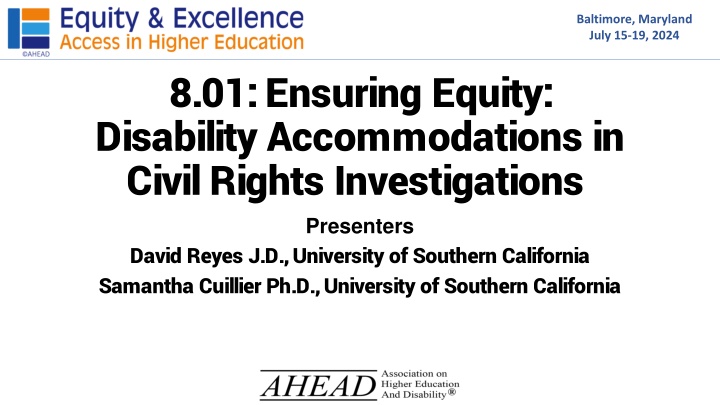
Equity in Civil Rights Investigations: Disability Accommodations
Explore topics such as Title IX policy definitions, collaborative strategies for equity, and practical scenarios in ensuring disability accommodations in civil rights investigations. Join us in creating a culture of access, inclusion, and respect at the Baltimore, Maryland conference. Acknowledge the indigenous lands and engage with presenters David Reyes and Samantha Cuillier from the University of Southern California.
Download Presentation

Please find below an Image/Link to download the presentation.
The content on the website is provided AS IS for your information and personal use only. It may not be sold, licensed, or shared on other websites without obtaining consent from the author. If you encounter any issues during the download, it is possible that the publisher has removed the file from their server.
You are allowed to download the files provided on this website for personal or commercial use, subject to the condition that they are used lawfully. All files are the property of their respective owners.
The content on the website is provided AS IS for your information and personal use only. It may not be sold, licensed, or shared on other websites without obtaining consent from the author.
E N D
Presentation Transcript
Baltimore, Maryland July 15-19, 2024 8.01: Ensuring Equity: Disability Accommodations in Civil Rights Investigations Presenters David Reyes J.D., University of Southern California Samantha Cuillier Ph.D., University of Southern California
Baltimore, Maryland July 15-19, 2024 Conference Civility Statement We ask you to join us in creating a culture that reflects Access and Inclusion and Civility and Respect this week and in all aspects of our organization.
Baltimore, Maryland July 15-19, 2024 Land Acknowledgment The Baltimore, Maryland area rests on the unceded lands of the Piscataway and Susquehannock peoples. We recognize the enduring presence of more than 7,000 indigenous peoples in Baltimore City, including the Piscataway, Lumbee, and Eastern Band of Cherokee community members. We recognize that Baltimore today is a community of many diverse Native peoples who continue to live and work here. We also acknowledge the systemic policies of genocide, relocation, and assimilation that still impact many Indigenous/Native American families today. As settlers and guests on these lands, we respect the work of Indigenous leaders and families, and pledge to make ongoing efforts to recognize their knowledge, creativity, and resilience.
Baltimore, Maryland July 15-19, 2024 Meet the Presenters David Reyes (he/him), Senior Investigator, University of Southern California Samantha Cuillier, (she/her), Senior Investigator, University of Southern California
Baltimore, Maryland July 15-19, 2024 Disclaimer U.S. Department of Education released new Title IX Regulations on April 19, 2024, effective on August 1, 2024. Please note, all practical scenarios and supportive measures discussions in today's presentation pre-date the new release.
Baltimore, Maryland July 15-19, 2024 Today s Presentation Topics Title IX and Applicable Policy Definitions Collaborative Strategies for Equity/Title IX and Disability Services offices Accommodation/Supportive Measures Examples and Group Discussion Practical Scenarios and Group Discussion Q&A
Baltimore, Maryland July 15-19, 2024 Title IX of the Education Amendments of 1972 No person in the United States shall, on the basis of sex, be excluded from the participation in, be denied the benefits of, or be subjected to discrimination under any education program or activity receiving federal financial assistance.
Baltimore, Maryland July 15-19, 2024 What is an Equity or Title IX Investigation? Not Every Formal Complaint Results in Investigation: There will be reports that do not rise to the level of a policy violation or jurisdictional barriers. Reporting Options for Reporting Parties: Only support, only document experience, or filing a Formal Complaint. Resolution Options: Some complaints can be resolved before initiating a formal investigation or may be alternatively resolved after an investigation has been noticed. Supportive Measures and Resources: These are none punitive measures which are meant to restore equity to those impacted by an investigation.
Baltimore, Maryland July 15-19, 2024 What is an Equity or Title IX Investigation? (cont.) Notice and Participation: All involved parties are afforded notice and the opportunity to participate in the investigation process, ensuring fairness and transparency. Use of Institutional Collaboration: Equity/Title IX offices collaborate with other institutional entities to gather relevant information, leveraging partnerships for comprehensive investigations. Alternative Resolution Option: Under certain circumstances, the parties may be able to conclude an ongoing investigation though mutual agreement as to the outcome.
Baltimore, Maryland July 15-19, 2024 Best Practices for Investigations Strong record keeping and organization. Set clear expectations for participants to an investigation. Timeline, Resolution Process Milestones, options. Trauma Informed investigatory practices. Understanding of your institution's resolution process and options. Important Note: Student participants need not be registered with Disability Services to receive supportive measures.
Baltimore, Maryland July 15-19, 2024 Title IX Sexual Harassment Quid Pro Quo: A University employee conditions the provision of an aid, benefit, or service of the University on an individual s participation in unwelcome sexual conduct. Harassment: Unwelcome conduct determined by a reasonable person to be so severe, pervasive, and objectively offensive that it effectively denies a person equal access to the University s education program or activity.
Baltimore, Maryland July 15-19, 2024 Sexual Assault Sexual assault is having or attempting to have sexual contact with another individual without consent or where the individual cannot consent because of age or temporary or permanent mental incapacity.
Baltimore, Maryland July 15-19, 2024 Dating Violence & Domestic Violence includes any act of violence committed by an individual: 1. who is or has been in a social relationship of a romantic or intimate nature with the Reporting Party; and 2. where the existence of such a relationship shall be determined based on a consideration of the following factors: i. The length of the relationship; ii. The type of relationship; and iii. The frequency of interaction between the individuals involved in the relationship.
Baltimore, Maryland July 15-19, 2024 Stalking Stalking occurs when an individual engages in a course of conduct directed at a specific individual under circumstances that would cause a reasonable person to fear for their own safety or the safety of others or suffer substantial emotional distress. Stalking includes the concept of cyber-stalking, a particular form of stalking in which electronic media such as the internet, social networks, blogs, cellphones, texts, or other similar devices or forms of contact are used.
Baltimore, Maryland July 15-19, 2024 Question and Discussion #1 By show of hand, who in this room knows who on their campus is the Title IX Coordinator or how to contact the relevant Equity/Title IX office?
Baltimore, Maryland July 15-19, 2024 Best Practices for Collaboration Establish Protocols for Sharing Information Coordination: Title IX Coordinators should establish clear protocols for sharing information with Disability Services while ensuring confidentiality and compliance with legal requirements. Preliminary Information Gathering Initial Steps: Obtain relevant information from Disability Services before initiating an investigation to ensure requested/granted accommodations are considered from the outset.
Baltimore, Maryland July 15-19, 2024 Best Practices for Collaboration (cont.) Joint Education for Informal Resolutions Collaborative Training: Conduct joint educational sessions between Title IX and Disability Services staff to improve understanding and facilitate informal resolutions. Proactive Outreach and Education Community Engagement: Identify areas for proactive outreach and education to raise awareness about the availability of accommodations and support services for students involved in Title IX processes.
Baltimore, Maryland July 15-19, 2024 Question and Discussion #2 In what ways have you seen effective collaboration between Equity/Title IX and Disability offices to support inclusive campus environments?
Baltimore, Maryland July 15-19, 2024 Equity/Title IX Supportive Measures: Guidance Purpose: Designed to restore or preserve equal access to education, safeguard student and employee safety, or deter sexual harassment. Cost: Provided at no cost as reasonably available. No Formal Complaint Required: Supportive measures can be accessed without the need for a formal complaint.
Baltimore, Maryland July 15-19, 2024 Equity/Title IX Supportive Measures: Guidance (cont.) Accommodations: Similar to disability accommodations, if a supportive measure significantly alter a program or compromise academic standards, alternatives must be considered. Documentation Flexibility: Unlike requirements for students with disabilities, documentation requirements for accessing supportive measures are less rigid, allowing for greater flexibility and responsiveness to individual needs.
Baltimore, Maryland July 15-19, 2024 Common Supportive Measures Requests Support Person for Communication: Access to a support person to assist in overcoming communication barriers during proceedings. Extensions for Assignments: Offer students on extensions of deadlines or other course-related adjustments. Attendance: Modification of work or class schedules, and leaves of absence. Excused Absences: Offers students excused absences from class or work.
Baltimore, Maryland July 15-19, 2024 Common Supportive Measures Requests (cont.) Extended Review Time: Provides for extended time to review and respond to documents related to the investigation. Interpreter Services: Access to interpreter services to ensure effective communication for all parties involved. Additional Breaks: Permission for additional breaks during interviews or hearings to accommodate individual needs and promote comfort and focus.
Baltimore, Maryland July 15-19, 2024 Question and Discussion #3 Can you share examples of challenging interactions between your institution's Equity/Title IX and Disability Services offices during a formal investigation?
Baltimore, Maryland July 15-19, 2024 Potential Roadblocks to Support Not appropriately considering individual needs. Not understanding the area to be accommodated. Institutional push back or refusal/failure to implement. Timing issues, particularly when focused on exams, timed deadlines, etc.
Baltimore, Maryland July 15-19, 2024 Scenario #1 A student disclosed a disability to their instructor. The instructor offered a list of resources to the student. The student engaged in the interactive accommodation process with the Disability Services office on campus. The student failed the class before any accommodations were approved by the Disability Services office; however, if the approved accommodations were in place at the time of the course, the student wouldn't have failed. What are important considerations?
Baltimore, Maryland July 15-19, 2024 Scenario #1 Considerations At what point in the semester did the student raise concerns with their professor and seek to engage in the interactive process? Did the Disability Service Office follow its process and engage in the interactive process in a timely manner. May review practices for identifying students with disabilities and raise awareness on how students can request accommodations. Ultimately, retroactive accommodations will not typically be granted.
Baltimore, Maryland July 15-19, 2024 No Retroactive Accommodations It is important to note that retroactive accommodations are not viable, whether in the context of misconduct, academic failure. As a matter of law, retroactive leniency for past misconduct is not a request for a reasonable accommodation. Retroactive consideration for condemnations after academic failure is not a reasonable accommodation.
Baltimore, Maryland July 15-19, 2024 The Ugly Truth The Equity/Title IX office do receive complaints about conduct administered by the Disability Services office.
Baltimore, Maryland July 15-19, 2024 Scenario #2 A student reports they were denied an accommodation by the Disability Services office and filed a formal complaint with the Equity/Title IX office. The student also requests supportive measures. What are important considerations?
Baltimore, Maryland July 15-19, 2024 Scenario #2 Considerations Was the student registered with the relevant Disability Services Office? Did the student engage in the interactive process and provide documentation? Like disability accommodations, if supportive measures fundamentally alter a program or lower academic standards, they are not reasonably available and need to consider alternatives. We do not want to grant accommodations that have been specifically denied through the relevant Disability Services Office. (Forum Shopping)
Baltimore, Maryland July 15-19, 2024 Disability Service Specialists may be Equity/Title IX Witnesses In a formal investigation, witnesses are individuals who may have information relevant to the incident, including individuals who may have observed the acts in question, may be able to provide contextual information, or may have other information related to the incident, the disclosure, or related matters. In a formal investigation, witnesses may also be offered to provide subject matter expert information.
Baltimore, Maryland July 15-19, 2024 Question and Discussion #5 Has anyone ever been called upon as a witness in an Equity/Title IX formal investigation, who wishes to share their experience?
Baltimore, Maryland July 15-19, 2024 Scenario #3 A student disclosed they have a disability to their instructor via email. What should the instructor do? a. Thank the student for sharing and provide them with an accommodation. b. Notify the Department Chair. c. Give students a list of resources on campus. d. Contact the Disability Services office to start the interactive process. e. Something else.
Baltimore, Maryland July 15-19, 2024 Scenario #3 Considerations Centralized Approval: The Disability Services office should be the sole Institutional entity approving classroom accommodations. Instructor Flexibility: While appreciated, instructors implementing their own accommodations risk violating institutional policies. Impact over intent. Privacy Respect: Instructors must always obtain a student s permission before sharing any private information. Student-Led Process: The interactive process for accommodations should be initiated by the student, not the instructor. Providing a list of resources is often the best approach
Baltimore, Maryland July 15-19, 2024 Title IX Challenges for Students with Autism Social Cues: Students with autism may struggle to discern socially acceptable behavior. This difficulty can lead to misinterpretations and Title IX-related issues Stalking: A Prevalent Concern: Students with autism may inadvertently engage in behaviors perceived as stalking. Challenges in understanding boundaries and social cues contribute to this risk.
Baltimore, Maryland July 15-19, 2024 Title IX Challenges for Students with Autism (cont.) Vulnerability to Manipulation: Students with autism may be more susceptible to manipulation or exploitation by others. This increases their risk of encountering Title IX issues Lack of Clear Social Guidelines: The absence of explicit rules on social interactions, dating, and party conduct complicates Title IX matters for students with autism.
Baltimore, Maryland July 15-19, 2024 Relevant Factors for Investigators: Students with Autism Nonconforming Appearance and Behavior: Instances where individuals deviate from expected norms. This can lead to potential bias or misunderstanding. Masking: Concealing one's true feelings or experiences, which may hinder effective communication and disclosure of information. Lack of Sex Education: Insufficient knowledge or understanding of sexual rights, boundaries, and responsibilities.
Baltimore, Maryland July 15-19, 2024 Relevant Factors for Investigators: Students with Autism (cont.) Difficulty Reading & Sending Signals: Difficulty Understanding the subtle cues and messages conveyed through interactions with others. Literal Interpretations: The potential for misinterpretation when taking words or actions at face value. Social Naivet : Lack of awareness or understanding of social dynamics and implications.
Baltimore, Maryland July 15-19, 2024 Scenario #4 A male student who is registered with the Disability Services office based on an Autistic diagnosis is reported to the Equity/Title IX office for sexually harassing and stalking a female student. What are ways to support both students in an institutional response?
Baltimore, Maryland July 15-19, 2024 Scenario #4 Considerations Impact: What is the impact of the conduct on the Reporting Party? Safety: Are there safety concerns or threats of physical harm? Informal Resolution: Depending on the nature of the underlying facts, informal resolution where voluntary coaching may provide needed education and prevent reoccurrence of the reported conduct. Non-punitive Remedial Measure: A no-contact directive can be issued to ensure no future contact occurs between the parties.
Baltimore, Maryland July 15-19, 2024 Thank you for attending!

